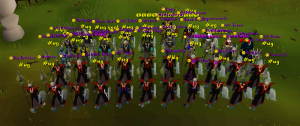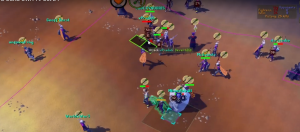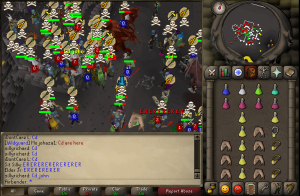War
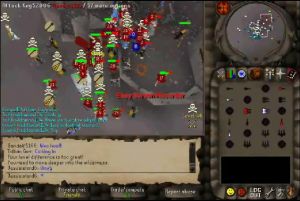
- See also: PKRI
A war is a PvP event in Old School RuneScape in which two or more clans fight against each other. Wars are held in the Wilderness or Clan Wars arena (CWA), and are a demonstration of the clans' strength, power, and skill. The Wilderness Guardians has fought in thousands of wars since 2004, and continues to hold wars regularly.
A PKRI (Player Killing Run-In) is a variation of war where "returning" is permitted: players, once killed, are expected to re-gear, return, and continue fighting for the duration of the fight.
WG fought their first war in 2004, and the clan continues to hold wars in Old School RuneScape. Prior to OSRS, wars were previously held in RuneScape 2 and DarkScape - like all other PvP events, they are not held in RuneScape 3 due to the game's unpopular and unbalanced PvP.[1]
Contents
Preparation
To hold a war, the staff of one clan (in WG this is usually the Leader or Head Warlord) must first make a declaration of war with another clan. Historically a declaration was often made in writing, which was posted on diplomatic boards on a clan's forums. In modern times, organising a war is generally simple enough to be done via messages over Discord. The opponent's staff will consider, discuss and/or modify, and ultimately accept or reject the declaration. If it is accepted, the Terms of War must also be set and agreed upon.
Once the diplomacy is complete, the staff will notify clan members of the upcoming fight and instruct them to prepare ("prep"). The amount of time allocated for prep varies greatly, and can be from as little as half an hour to as much as a week or more. All of the relevant information pertaining to the fight will be posted on the clan's forums and/or in their Discord server, and members are expected to familiarise themselves with the terms, ensure they have the necessary gear and supplies, and make time for themselves to attend the war. Large-scale wars occasionally warrant the production of a war preparation video by the staff to relay all of this information.
Roughly 30 minutes to 1 hour before the fight, the clan will organise themselves in-game ("mass") at a predetermined location - usually at a bank or bank chest. Common massing locations for WG are Juliet's House in Varrock and the west bank of East Ardougne. The clan members will equip and prepare their characters for the fight, and will head to the fight area shortly before the starting time. WG occasionally enjoys taking part in historical traditions such as marching up into the Wilderness from Edgeville, and occasionally the leadership giving a pre-war speech over Discord.
It is common for the two or more clans fighting to greet each other before the fight, compare starting numbers and cut members to match if necessary, and wish each other good luck. One clan will then "defend" (usually the clan with greater numbers) and take up a defensive formation within the bounds. Common defensive positions are:
- Spread out, sometimes around an obstacle such as a rock or tree. Common in P2P multi-spells fights.
- A death dot (DD) where members all stand on one square. Common in P2P single-spells fights.
- A death dance where members all follow each other, making it harder for the attacking clan to right-click and choose a target. Common in F2P fights.
- A box formation. Common in historical F2P fights.
The attacking clan, when ready, will charge the defending clan and the fight will commence.
The Fight
The main battle of a war is referrred to as the fight. Victory of a knock-out fight is achieved if all members of the opposing clan are killed. Victory in a PKRI comes as a result of reaching one of the following pre-determined goals:
- To "clear" the opposing clan, by killing enough of the opposing members so that they cannot continue fighting
- To "outlast" the opposing clan, by continuing the fight long enough that the opposing clan decides to "end" and their members leave/stop returning
- To have the most members remaining at the end of the fight - a common method of determining a victor in a fight with only a time cap
- To obtain a greater number of kills than the opposing clan - some CWA fights have a "kill cap" where the first clan to reach a certain number of kills is declared the victor
In order to ensure victory, clans and members will utilise various tactics and strategies to try and achieve victory over the opponent.
Offensive Tactics
- Piling - all members focusing their attacks on one opposing player, so as to kill them as quickly as possible
- Transitioning - switching quickly from one pile to a different player, in the hopes of catching them off-guard
- Clumping - concentrating multi-combat attacks (such as ice barrage and black chinchompas) on opposing players which are closely grouped together
- Sniping - having a select few members target opposing players who are not the current pile (usually mages in weak defensive armour)
- Mass-sniping - all members sniping with no main pile going, in an attempt to disorient the opponent and "break" their pile
- Sneak maging - switching between strong offensive gear (e.g. mage robes) and defensive (e.g. dragonhide) between casts, in order to reduce incoming damage
Defensive Tactics
- Tanking - switching to armour with high defensive bonuses and eating food to heal, in order to survive an enemy pile as long as possible
- Hugging - manoeuvring around furniture such as trees or rocks, in order to clump an enemy pile or delay their attacks
- Dragging - running a great distance (sometimes away from the main fight), in order to disorganise the enemy and/or force them to "drop" the pile
Crashing
A crash occurrs if another clan who was not intended to take part in the war somehow becomes involved in the fight. Crashes are often accidental, and the result of the "crasher" simply finding the fight during a PK trip of their own. However, intentionally crashing a war is a dishonourable tactic common in rivalries between clans. This is often achieved by the crasher using information gained from spies or scouts to determine the fight's time and location, and is done with the intent of preventing the warring clans from having and enjoying a "clean" fight.
In the event of a crash, the warring clans may chose to:
- Pause the fight and and fight together against the crasher
- Request assistance from another clan to fight the crasher (known as an "Anti-Crash" or "AC")
- Leave and restart the fight, possibly in a different location, to try and evade the crasher
- End the fight and concede a draw
Ending
At the end of a fight with no issues ("clean"), it is common for the victor to take a fall-in and count/take screenshots of their final numbers ("taking an ending"). The clan may also spam messages such as "good fight" in respect of their opponent's performance, and the opposing clan if still present may do the same. All players then leave the area, and the war is considered over - though subsequent events to celebrate a successful war such as a drop party or PK trip may sometimes follow. The staff who organised the war will post a recap of the war on the forums for members to discuss the fight. For the sake of publicity, the staff will often share the result and screenshots on RuneScape clan-related communities such as fansites, or on social media such as X.
Notable Wars
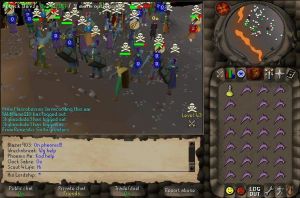
WG has had thousands of wars over the many years of its existence. Some of the more well-known wars are:
| War | Date | Result | Notes |
|---|---|---|---|
| WG vs Rune Outlaws (2004) | 27-28 November 2004 | Victory by default | WG's first war. |
| WG vs The Unbreakables | 5 June 2005 | Victory | Victory gained widespread recognition for WG. |
| WG vs Dead on Arrival | 9 July 2005 | Crashed, projected victory | WG's first P2P war, and the first war in RuneScape to use Ancient Magicks. |
| WG vs Black Dragons | 7 January 2006 | Victory | Victory put WG in the top 5 P2P clans. |
| X vs DS | 22-23 July 2006 | Defeat | Multiple clan alliance taking on the #2 F2P clan. |
| WG vs Crimson Raiders | 3 January 2009 | Victory | Victory gained WG rank 10 on the RuneScape Community RAW list. |
| The Great War | 31 January 2010 | Defeat | Large-scale war against The British Crusaders. |
| The Battle of Turning Tides | 27 June 2010 | Victory | Large-scale war against Dangerous Business which ended a six-month losing streak. |
| WG vs Pink Patrons of Pain | 9-10 April 2011 | Victory | War against a clan run by Jagex moderator Mod Poppy. |
| WG vs Poison | 5 May 2013 | Crashed, victory | WG's first war in Old School RuneScape. |
References
- ↑ Shmungle1380 (28 July 2024), "Is it true that the pvp in rs3 isnt as good as old school runescape?", Reddit. Retrieved 31 March 2025.
